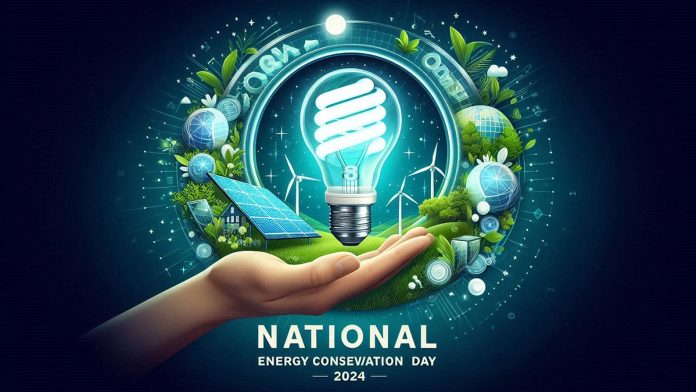Dr Parshotam S. Manhas
“Earth provides enough to satisfy every man’s needs but not every man’s greed.” …. Mahatma Gandhi
National Energy Conservation Day is observed on December 14thevery year since 1991 to demonstrate public awareness about the importance of conserving energy and to showcase the achievements of India in energy efficiency and conservation. This day serves as a reminder to adopt eco-friendly habits and make energy conservation an integral part of our lives. The ultimate goal of energy conservation is sustainable energy usage which guarantees that present demands are met without compromising the capacity of future generations to satisfy their own. The theme for 2024 is” Power Sustainability: Every Watt Counts”. This theme underscores the importance of every small endeavor in conserving energy, encouraging individuals, institutions, industries, and governments to adopt sustainable energy practices. In a world facing environmental challenges, every watt we save brings us closer to a greener sustainable future. Today, National Energy Conservation Day holds even greater significance as the world faces the dual challenges of climate change and energy security. By promoting energy conservation, we can reduce our reliance on fossil fuels, mitigate climate change and create a more sustainable future for all.
National Energy Conservation Day 2024
National Energy Conservation Awards were initiated by the Bureau of Energy Efficiency (BEE)under the Ministry of Power, Government of India to acknowledge the efforts made by industries units, institutions and establishments to reduce energy consumption while maintaining their production. The awards were given away for the first time on December 14th, 1991 which was declared as the ‘National Energy Conservation Day’. These awards are distributed annually by eminent dignitaries holding high positions in the Government of India in a function organized on 14th December. BEE contributes to the development and implementation of plans and programs to reduce excessive energy consumption. To mitigate the effects of climate change through holistic development, the committee also signed the Energy Conservation Act in 2001. The BEE collaborates with designated consumers, designated agencies, and other organizations to identify and leverage existing resources and infrastructure in fulfilling its objectives.
In addition, the National Energy Efficiency Innovation Awards (NEEIA) were introduced in 2021 to recognize exceptional contributions and innovations in the field of energy efficiency. NEEIA invites applications in two categories: Category A for professionals from the Industries, Building, and Transport sector, and Category B for Students and Research Scholars. The evaluation criteria include reliability, affordability, reliability, impact on energy savings, and impact on environment and sustainability.
The Ministry of Power also organizes the Painting Competition on Energy Conservation since 2005. This competition, conducted at the School, State, and National levels, aims to instill awareness and promote the efficient use of energy. Students from 5th to 10th standards participate in two groups, ‘A’ and ‘B’, corresponding to their respective grades.
Energy conservation in fact refers to the prudent use of available resources and the prevention of energy wastage through efficient methods. To have a greater impact on the energy conservation strategy, energy conservation should be ingrained in every human’s behavior. In India, government has passed “Energy Conservation Bill, 2001” for better utilization and conservation of energy. It is mandatory for energy intensive sectors to get their “Energy Audit” conducted by accredited energy auditor. BEE keeps watch on energy consumption patterns, develops norms for appliances etc. It also organizes different competitions e.g. poster & slogan competition etc. for children. BEE has also initiated “Star Rating System” for electrical appliances e.g. refrigerator, ACs, geysers etc. In this system, 1-5 stars are allotted to products depending on their energy efficiency. A five-star product means that it consumes least energy in its segment.
The Ministry of New and Renewable Energy (MNRE) has released its latest data from October 2023 to October 2024, highlighting substantial growth in India’s renewable energy sector. This progress underlines India’s commitment to achieving its clean energy targets in line with the ‘Panchamrit’ goals set by Prime Minister Narendra Modi. India’s total renewable energy installed capacity increased by a staggering 24.2 GW (13.5%) in a year, reaching 203.18 GW from 178.98 GW. This significant rise aligns with India’s ambitious targets in the field of RE sector. Including nuclear energy, the total non-fossil fuel capacity rose to 211.36 GW in 2024, compared to 186.46 GW in 2023.
As of October 2024, large hydro projects contributed 46.93 GW to India’s renewable portfolio, while nuclear power capacity contributed 8.18 GW. These contributions strengthen the diversity and resilience of India’s renewable energy mix, supporting the country’s comprehensive approach to green energy transition.
This significant increase is a testament to our commitment to sustainable development and clean energy.
Energy conservation is vital for ensuring a sustainable future and shall be met by adopting following remedial measures:
* Switch off lights and appliances when not in use.
* Use energy-efficient appliances.
* Walk, cycle, or use public transportation instead of driving.
* Plant trees to absorb carbon dioxide.
* Encourage green lighting projects
* Conduct Energy Audits
* Educate others about the importance of energy conservation.
As a consequence of these measures, we can:
Lower Environmental Impact: Less energy usage reduces carbon emissions and mitigates climate change.
Save Resources: Conserving energy helps preserve finite natural resources like coal and petroleum.
Maximize Economic Benefits: Lower energy bills and reduced costs for businesses contribute to economic growth.
Empower Sustainable Development: Energy efficiency is a cornerstone of sustainable development goals.
(The author is presently working as an Associate Professor of Physics at GGM Science College Jammu)


